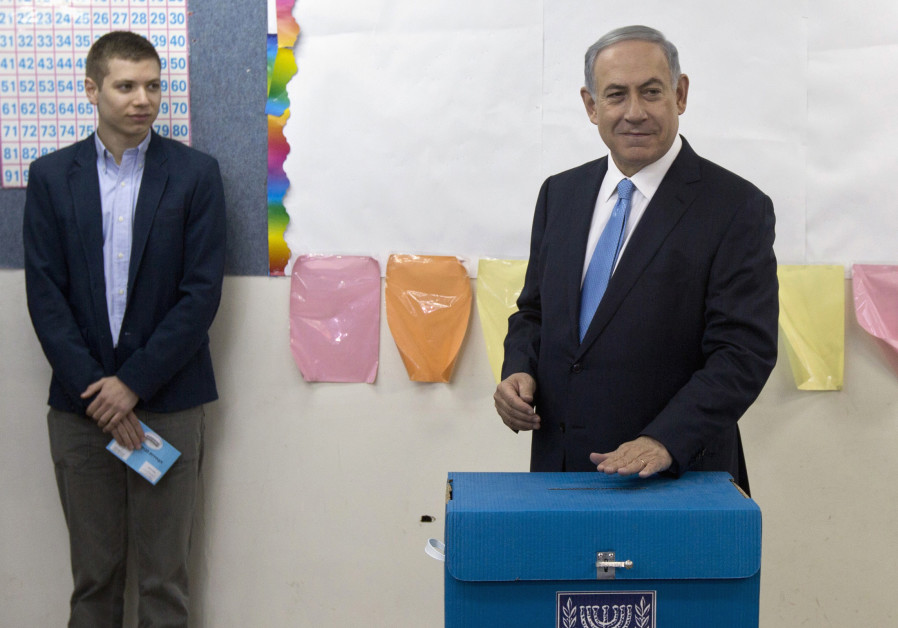Netanyahu hints at early elections in first half of 2019

Yair Netanyahu observes his father Israeli Prime Minister Benjamin Netanyahu casting a ballot in the 2015 elections.. (photo credit: REUTERS/SEBASTIAN SCHEINER/POOL)
Prime Minister Benjamin Netanyahu told his coalition partners for the first time on Sunday that he is no longer aiming to complete his government’s term, set to end in November 2019.
Instead, he hinted to the heads of the parties in his government that shortly after the Knesset returns from its extended summer and holiday recess in October he would initiate elections, which would be held in the first half of next year.
“I want to continue with this coalition until almost the end of the term,” he said. “This is a terrific coalition.”
Netanyahu made the statement during a heated debate about the controversial haredi (ultra-Orthodox) enlistment bill. After United Torah Judaism leader Ya’acov Litzman said he failed to persuade all of his party’s rabbis to back the bill, Bayit Yehudi head Naftali Bennett said the date of the election should be connected to ongoing efforts to reach a compromise on the bill that would take place while the government requests an extension from the High Court of Justice to pass it.
Sources close to Netanyahu said he would request an extension of nine to 10 months beyond the September deadline set by the court to pass a new law. If it is granted, the election could be as late as May. If the court grants a shorter extension, the election may take place as early as the end of January.
Rabbis of Agudat Yisrael, the hassidic half of the UTJ Knesset faction – and consequently the party’s three MKs – oppose a clause in the bill providing for financial sanctions against the general yeshiva budget if enlistment targets are not met, and have vowed they would quit the coalition if the legislation passes with such sanctions.
The High Court of Justice struck down the previous arrangement for blanket haredi exemptions from IDF service last September and gave the government 12 months to draft a new, less discriminatory law.
But the Knesset summer session ends on July 19 and lawmakers only reconvene in October, giving the government barely any time to overcome the ardent opposition of Agudat Yisrael to the new legislation.
Should the Knesset fail to pass a new law and the High Court refuse the extension, all haredi men eligible for military service would be obligated to enlist when the deadline expires in September.
Sources in Agudah and Shas confirmed it was likely that an extension from the High Court will be sought.
In the meantime, Degel Hatorah, the other, non-hassidic half of UTJ, together with Shas, are furtively supportive of the new legislation since its terms, even the financial sanctions, are relatively lenient, and would not take effect for at least three years.
Passing the law now would take the political sting out of the issue for the next elections, and they could insist on modifications to the new enlistment law during coalition negotiations when the new government is being put together.
According to one Degel source, the party is seeking to continue preparing the bill in committee this week, so that in the event there is a total breakdown in relations with Agudah, the bill could still be passed on time even without the latter’s support.
A spokesman for coalition chairman MK David Amsalem, who is chairing the special committee for the bill, said the situation was “fluid” and it would only be decided on Monday whether or not there could be further progress on preparing the bill in committee.
Netanyahu said in the meeting of party heads that he intends to pass the controversial nation-state bill by next Monday. He expressed hope that Tourism Minister Yariv Levin (Likud) could reach an agreement among the coalition partners on a final draft of the bill by then.
The prime minister sparred in the meeting with Finance Minister Moshe Kahlon, who called Netanyahu a “philosopher who only knows how to talk while we get things done.”






Comments are closed.